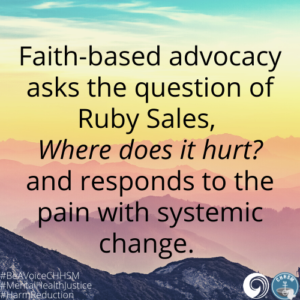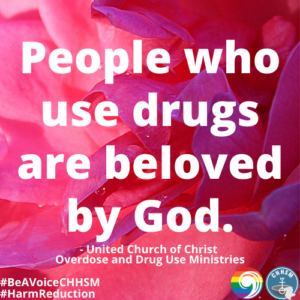October Installment of Be a Voice Toolkit Focuses on Mental Health and Substance Use

The oft-times partnered issues of mental health and substance use can cause complex treatment challenges — and solutions — for CHHSM members. One example is making sure health care professionals assisting persons of color are trained in cultural competency so that they can help their clients with mental health and substance use problems that arise from the combination of historical trauma and current societal ills.
This month, the Be A Voice Health and Human Service Advocacy Toolkit — produced by CHHSM and the UCC’s Justice and Witness Ministries office in Washington, D.C. — examines a faith-based response to mental health problems and substance use in local communities. The new section, “Mental Health and Substance Use,” will be online Oct. 19. It gives an historical and a current societal context and how serving leaders can help people with mental health issues and/or substance misuse.
Knowledge of historical trauma as it affects African Americans and other persons of color is part of cultural competency, says Niquanna Barnett, in-home family therapist and intake specialist at Orion Family Services in Madison, Wis. “Understanding historical trauma and microaggressions can help with understanding the different cycles of emotions many African Americans are experiencing in conjunction with current societal events,” she says.
Embedded in historical trauma is the intersection between trauma and the current criminal justice system. The justice system, tellingly, is the largest mental health provider in the United States. The toolkit cites the Stepping Up Initiative, which reports that large numbers of people with mental illnesses continue to cycle through the criminal justice system, often resulting in tragic outcomes, missed opportunities for treatment, and a failure to improve public safety.
Acknowledging and holding space for the historical trauma — the history of an individual’s community — must be present in the therapeutic process, Barnett adds, because it impacts the way a client “moves through the world.”
As the toolkit describes, the need is particularly great today, as persons of color remain disproportionately affected by COVID-19, police brutality, institutional racism and policy inequities.

One UCC group leading the faith-based response to mental health needs is the UCC’s Mental Health Network. Begun in 1992, it provides a way for people to share experiences, resources, and support around mental health. The network has a certification process for UCC congregations called “Welcoming, Inclusive, Supportive and Engaged for Mental Health” (WISE). This process helps local churches become a hospitable place of belonging for those living with mental health challenges and their loved ones.
Drug Use, Mental Health, and Punitive Policies
The UCC’s Overdose and Drug Use Ministries (ODUM) is a newer project that focuses on supporting local churches engaging in overdose and drug use ministries. Says ODUM Project Coordinator Erica Poellot, in many congregations, “drug use is an issue that people are dealing with, but folks are having a hard time articulating it.” ODUM uses education and harm reduction strategies, and helps highlight the intersection of drug use with social inequities, stigma, and trauma. It works to include the role of faith and spirituality in the healing process.
The toolkit also highlights the history of the U.S. “War on Drugs,” begun in 1971 during the Nixon Administration. It increased drug prohibition policies and criminalization of drug use, sale, and distribution under the guise of a public health effort.
As the toolkit recounts, John Ehrlichman — Nixon’s counsel and assistant to the president for domestic affairs — remarked in a 1994 interview, “We knew we couldn’t make it illegal to be either against the war or black, but by getting the public to associate the hippies with marijuana and blacks with heroin, and then criminalizing both heavily, we could disrupt those communities.”

Those harmful, unjust policies created during the 1970s have worsened and remain in place today. Current policies and procedures around the “Drug War” still focus punitively on people, not drugs — and disproportionately marginalize persons of color and economically disadvantaged persons — but don’t reduce drug use or drug-related mental health issues. To combat these long-term injustices, many individuals and congregations are advocating for change.
Judson Memorial UCC in New York City is one such congregation. It is a co-founder of Faith in Harm Reduction, the only program in the United States dedicated to mobilizing communities at the intersection of harm reduction and faith-based organizing.
The Mental Health and Drug Use section of the toolkit highlights many of the CHHSM members who are on the front line of these societal challenges. In transitional housing programs, youth and young adult services, family services, HIV/AIDS treatment, women’s shelters, and free clinics — among other programs — CHHSM’s serving leaders work to not only provide services, but to reduce barriers to care among their clients.
Additionally, the toolkit provides historical context and a section on faith-based responses, including a segment on UCC-related responses. Most recently, CHHSM sponsored a resolution to the UCC’s General Synod in 2019 naming opioid addiction as a public health epidemic. The resolution, passed overwhelmingly by Synod delegates, emphasizes the disparities and injustices in access to treatment.
Resources and Questions for Candidates
In addition to a robust resource section of links to articles and organizations, the toolkit also includes current context, including questions for candidates running for public office. By placing mental health and substance misuse challenges in the context of social unrest, economic uncertainty and the COVID-19 pandemic, the toolkit discusses the additional barriers to assistance for an increasing number of people experiencing heightened worry and stress.
By 2029, “there could be an additional 75,000 deaths from suicide and alcohol/drug misuse as a result of the economic downturn,” says Katie Adams, the UCC’s policy advocate for domestic issues. And while sheltering in place during the pandemic has been good for society at large, this isolation has caused additional public health worries, she adds, as has the increased stress and anxiety experienced by front line workers.
“It is critical to include both mental health and services for people who use drugs and alcohol in our conversations about our country’s health care access,” Adams says.
To that end, the toolkit recommends asking candidates for public office about their plans and ideas for bolstering programs of care, including for those who are uninsured; and asking candidates how they will develop equitable policies not based on punitive measures.
“The upcoming election could provide an opportunity to work toward correcting the long-standing wrongs in the policies of institutions around mental health and drug use,” says the Rev. Elyse Berry, D.Min., CHHSM’s associate for advocacy and leadership development. “These issues are matters of spirituality and justice. The church can provide a vital place of hope and healing by engaging in this advocacy ministry.”
Access the Mental Health and Substance Use section of the toolkit.
Join Our Mailing LIst
"*" indicates required fields
